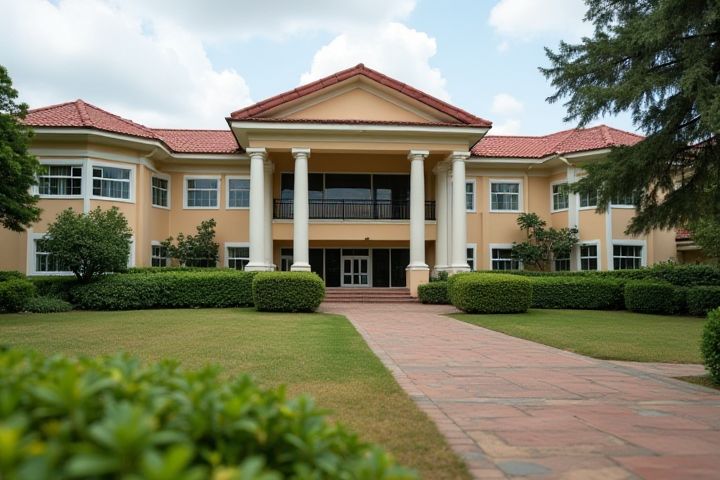
Academic institutions in Nigeria encompass a diverse range of universities, polytechnics, and colleges, each contributing uniquely to the nation's higher education landscape. The National Universities Commission (NUC) oversees the accreditation and regulation of degree-awarding institutions, ensuring quality education across various disciplines. Prominent universities such as the University of Ibadan and Obafemi Awolowo University are recognized for their research output and academic excellence. State-owned polytechnics and colleges also provide practical-oriented training in fields like engineering and technology, catering to the workforce needs of the economy. Enrolling in these institutions can significantly enhance your career prospects and contribute to Nigeria's development through innovation and skilled labor.
Unified Tertiary Matriculation Examination (UTME) for admissions
Academic institutions in Nigeria utilize the Unified Tertiary Matriculation Examination (UTME) as the primary standardized test for undergraduate admissions. Conducted annually by the Joint Admissions and Matriculation Board (JAMB), the UTME assesses students' readiness for tertiary education across various subjects. High scores in this examination significantly enhance applicants' chances of gaining admission into preferred universities, polytechnics, and colleges of education. Understanding the UTME structure and syllabus is crucial for students seeking to optimize their performance and secure a place in Nigeria's competitive higher education landscape.
National Universities Commission (NUC) accreditation
In Nigeria, academic institutions prioritize obtaining National Universities Commission (NUC) accreditation to ensure adherence to quality education standards. This accreditation process evaluates various factors, including the curriculum, faculty qualifications, and infrastructural facilities, enhancing institutional credibility. Achieving NUC accreditation not only boosts the institution's reputation but also assures students and parents of the quality of education provided. By meeting these rigorous criteria, universities can better prepare graduates for successful careers in a competitive job market.
Federal, State, and Private universities
In Nigeria, higher education encompasses a diverse range of institutions, including Federal, State, and Private universities. Federal universities are primarily funded and managed by the national government, offering a wide array of programs aimed at fostering research and innovation. State universities, on the other hand, receive funding from the individual state governments, often catering to local educational needs and promoting regional development. Private universities provide alternative options for students, typically featuring smaller class sizes and unique curricula, making higher education more accessible and tailored to specific interests.
Strike actions often affect academic calendars
Strike actions in Nigerian academic institutions frequently disrupt academic calendars, leading to significant delays in educational progress. These strikes, usually initiated by various labor unions, primarily aim to address grievances related to salaries, working conditions, and funding issues. As a result, students face extended periods of inactivity, impacting their learning experiences and timelines for graduation. Understanding the implications of these strikes can help you navigate your academic journey in Nigeria more effectively.
Nigeria's 6-3-3-4 educational system
Academic institutions in Nigeria emphasize the 6-3-3-4 educational system, which comprises six years of primary education, three years of junior secondary education, three years of senior secondary education, and four years of higher education. This structured approach aims to provide students with a well-rounded education, equipping them with both academic knowledge and vocational skills. The system fosters a holistic development paradigm that prepares graduates for the workforce while promoting lifelong learning. As you navigate your educational journey, understanding this framework can enhance your academic and career prospects within Nigeria's evolving educational landscape.
Importance of Student Industrial Work Experience Scheme (SIWES)
In Nigeria, academic institutions emphasize the significance of the Student Industrial Work Experience Scheme (SIWES) as a vital component of engineering and technology education. This program allows students to apply theoretical knowledge in real-world settings, enhancing their skills and employability upon graduation. By engaging with industry professionals during SIWES, students gain invaluable insights into workplace dynamics and industry standards. Understanding the practical implications of their studies equips you with a competitive edge in a rapidly evolving job market.
High demand for admission into public universities
In Nigeria, public universities are experiencing a high demand for admission, driven by an increasing population and the desire for higher education. This surge in applicants often leads to competitive entrance examinations, highlighting the need for effective preparation strategies among prospective students. Furthermore, the limited capacity of these institutions exacerbates the situation, as many qualified candidates are unable to secure spots each academic year. Understanding the admission landscape and exploring alternative educational pathways can enhance your chances of success in this challenging environment.
Scholarly emphasis on science, technology, engineering, and mathematics (STEM) courses
Academic institutions in Nigeria prioritize Scholarly emphasis on science, technology, engineering, and mathematics (STEM) courses, reflecting a national strategy to bolster innovation and economic development. These programs are designed to equip students with critical skills necessary for the evolving job market, fostering a generation of problem solvers and innovators. Research initiatives within STEM fields also receive substantial investment, aimed at producing cutting-edge solutions to local and global challenges. By integrating practical applications and theoretical knowledge, these institutions prepare graduates to excel in various technological landscapes.
Growing number of international partnerships and collaborations
Academic institutions in Nigeria are increasingly forging international partnerships and collaborations, enhancing their global reach and academic offerings. These partnerships often involve joint research initiatives, exchange programs, and collaborative degree offerings, which enrich the educational experience for students and faculty alike. Renowned universities are collaborating with prominent global institutions, thereby positioning Nigerian higher education on the international stage. Your academic journey can benefit from these opportunities, as they facilitate access to diverse perspectives and innovative practices in various fields of study.
Ongoing challenges with funding and resources
Academic institutions in Nigeria frequently encounter significant challenges related to inadequate funding and limited resources, impacting their overall effectiveness. Many universities struggle to provide quality education due to insufficient budgets for infrastructure, teaching materials, and research initiatives. Additionally, the lack of reliable internet access hampers digital learning opportunities and limits students' exposure to global academic standards. You may find that these ongoing issues hinder the development of a robust academic environment essential for fostering innovation and critical thinking among students.
